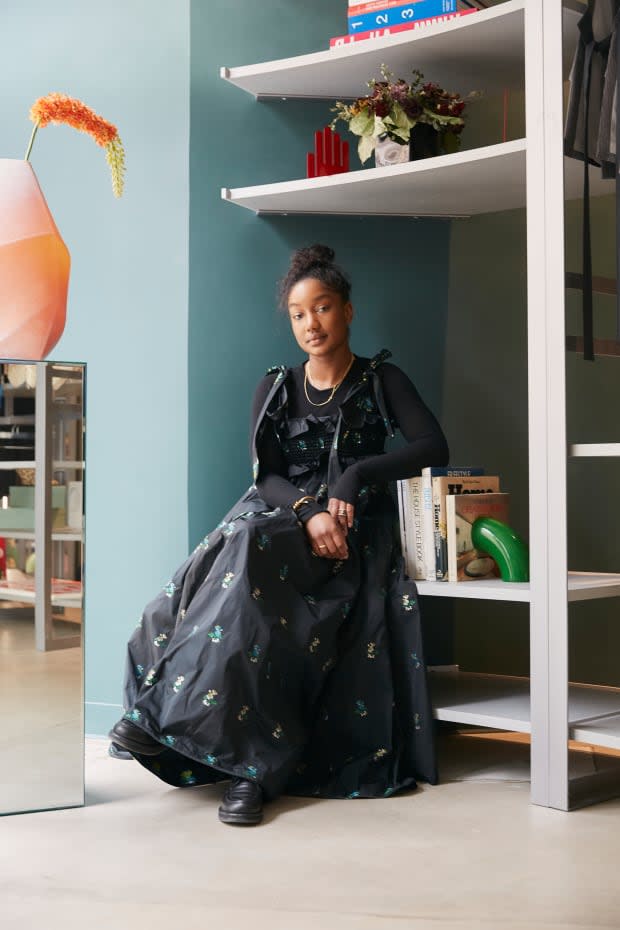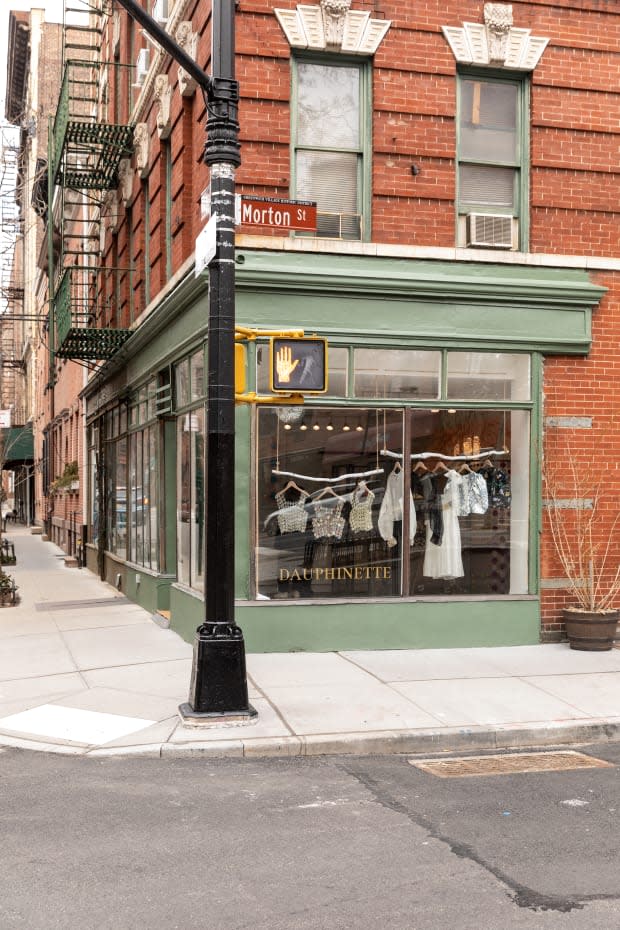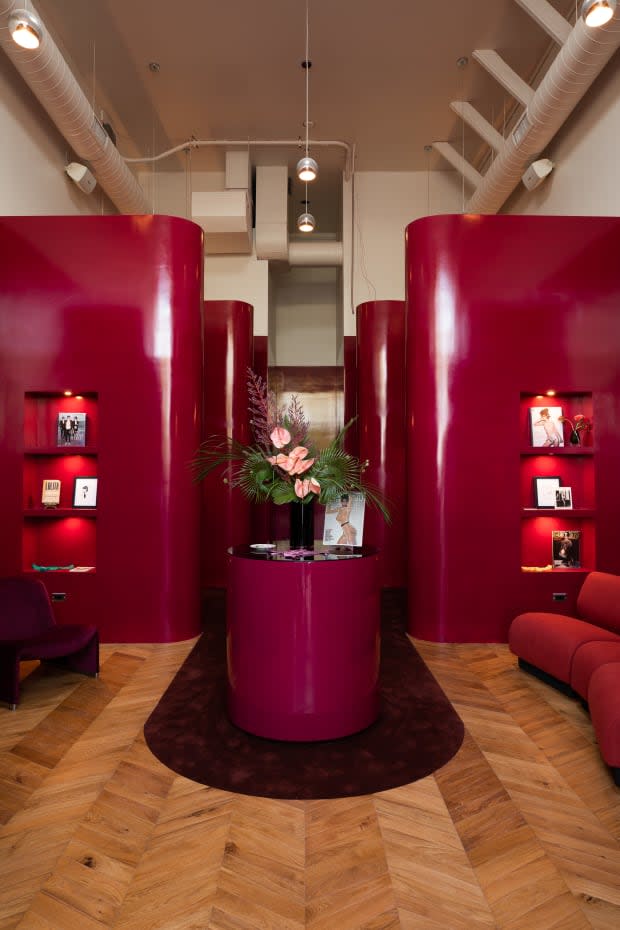These Stores That Opened Amid the Pandemic Can Hint at Where Retail Is Going
We caught up with people who opened clothing stores amid the pandemic about what's working and what isn't.
With closures and bankruptcies dominating headlines over the past year, the future of brick-and-mortar fashion retail may seem grim. But in the face of negative generalizations about the pandemic killing stores and eliminating demand for new clothes — and during what some might have considered the worst possible time to do so in, like, modern history — a handful of entrepreneurs have creatively opened brand-new physical storefronts in New York and Los Angeles. And, at least anecdotally, people are showing up to shop.
Take Telsha Anderson, who opened T.A., a thoughtfully curated boutique stocking global independent brands in New York's Meatpacking District, in the summer of 2020 to a pre-pandemic level of buzz. Or Dauphinette founder Olivia Cheng, who — thanks to high NYC retail vacancy rates — was able to set up shop on the charming West Village corner of her dreams in March 2021, only two years into her brand's existence. That same month, Emily Adams Bode took over the lease from a closing 40-year-old neighborhood coffee shop to introduce the Bode Tailor Shop, which serves up coffee, tailoring and mending services on the Lower East Side.
Across the country, in Malibu, Redone cofounder Sean Barron snapped up a rare lease for the upcycled denim brand's first standalone store in November, with several more to follow in and outside of L.A. Also in L.A., Jennifer Zuccarini opened up the first West Coast outpost of her luxury lingerie label Fleur du Mal, signing the West Hollywood lease pre-pandemic and officially opening this April.
There seems to be more at play here than simply entrepreneurs making the best of business expansion decisions they made pre-pandemic. While the past year-plus has been devastating in so many ways, there were silver linings to be found, and for many of the brand founders mentioned above, the opportunities outweighed — or at least equaled — the challenges of the Covid-19 crisis when it came to opening stores. Beyond that, they exemplify the idea that the pandemic didn't kill retail. It just changed what works.

One of those silver-lining opportunities was in real estate. In a recent Wall Street Journal piece about how commercial landlords have been willing to strike mutually beneficial deals with struggling tenants to avoid vacancies, Anne Kadet wrote: "The pandemic is creating opportunities for entrepreneurs looking to open new stores."
Dauphinette's Cheng credits the pandemic for the fact that she was financially able to open up shop not only much sooner than she expected, but also in her dream location.
"When I found the space, it was everything that I wanted — probably two-to-three years before I thought I would be ready for it, but it wasn't an opportunity that I was going to let slip by," she tells Fashionista. "I feel like a lot of the commercial real estate downtown opened up, and for the first time it was like, you can choose where you want to be rather than you take whatever is available and within your budget, and then trying to compete with all these other shops or all these other companies to try and grab the space."
Barron also took advantage of a "pretty good deal on the rent" for Redone's Malibu store. "The landlords and tenants are on a more even playing field now," he says. "You're working with them as opposed to working against each other, which, in the past, sometimes those relationships are a little challenging."
These store openings also represent a shift in the way people were shopping during the pandemic — and may continue to after. In the past, a prime retail location might be in a mall or major, tourist-heavy shopping thoroughfare, like lower Broadway or Fifth Avenue in New York or Rodeo Drive or The Grove in L.A. Because the pandemic effectively eliminated tourism and relegated residents to their own neighborhoods, it allowed smaller, community-focused local shops to thrive. Bode Tailor Shop is great example of this.
In its joint The State of Fashion 2021 report, McKinsey and Business of Fashion argued that, "as retail localization trends evolve, we're likely to see increasing numbers of small stores, enhanced with hand-picked inventories, and neighborhood stores designed to forge local connections. The relative importance of these new formats compared to large downtown stores will be a factor of how long the health crisis continues to restrict movement and of how long consumer preferences for local retail endures after that."
Cheng says Dauphinette's 500-square-foot West Village store has opened up the brand to the neighborhood's "older artistic types" — a different segment of consumers than the Gen Z-ers and millennials who follow it on Instagram.

"It wasn't something that I was thinking so much about, but when the local artists started coming by, they were so excited," she notes. "And the older establishments in the West Village that have been around for 30, 40 years were telling their clients, 'You should go see this store, it's really wonderful'... That made me really, really happy."
Barron was admittedly not sure how much business Redone would be able to do within the glass-walled Malibu shop's 200 square feet, especially during the colder fall and winter months. But he figured, worst case scenario, it would serve as advertising. ("When you drive by it looks like a huge billboard, so at least we were getting a billboard," he explains.) It's a logical approach: Increasingly, as online sales command a bigger share of retailers' bottom lines, brick-and-mortar is seen more as a vehicle for marketing and customer acquisition, versus purely as a distribution channel. But Barron has been pleasantly surprised.
"We've been doing the numbers that we thought we'd do during prime season. The community is excited because the women that live in Malibu are our customers — for them to be able to come and try the jeans on and look at the stuff and touch it versus buying it online is a wonderful thing," he says. "It's important that you develop relationships with people in Malibu because it's a very relationship community; it's not transient. So the women come in and they develop a relationship with the girls working here."
It's not necessarily easy for a retailer to connect with their local community. They need to offer something special, whether it's hard-to-find upcycled vintage Levi's or whimiscal, botanical-infused garments and accessories that hang on literal wooden branches.
Fleur du Mal's Zuccarini took this into consideration with her seductive Perron-Roettinger-designed store in West Hollywood. A press release described the aesthetic direction as "'70s Italian meets Studio 54, with a dash of Parisian sensuality." While I haven't yet been there in person, photos suggest it's unlike any lingerie store I've ever seen — and a prime example of using physical space to do more than sell merchandise.
Fleur du Mal has been doing plenty of that online. In fact, it saw a spike in sales for pajamas and loungewear, as well as sexier lingerie, during the pandemic, which allowed for the opening of this store, according to Zuccarini.

"I really wanted the design to feel very immersive and sexy and intimate; I don't think it looks like any other retail space in L.A.," she tells me. "We dedicated part of the space to have a little seating area, in most stores we have a bar. I love the social aspect of a store, I love it to be a place where people hang out and can be entertained."
Once it's possible, Zuccarini hopes to position the store as a "cultural hub" by hosting parties, educational talks with experts, champagne tastings and more.
Anderson's T.A. also embodies that one-of-a-kind feel, from the space itself to the curation of hard-to-find-brands. She also developed an in-store artist-in-residency program, committing to showcasing work by a new Black visual artist each season.
To be clear, though, it hasn't all been easy-breezy for these stores.
After signing a lease in January 2020, Zuccarini was forced to postpone the opening of Fleur du Mal's L.A. store from last June to this April. Meanwhile, the brand's New York location was forced to close from March until late last summer; when it reopened, she says, "Our whole block was dead, there was no foot traffic." (Fortunately, online sales remained strong.) Similarly, Barron was forced to postpone the opening of a bigger Redone flagship store on L.A.'s Melrose Avenue, for which he'd signed the lease before the pandemic hit.
And of course, across the board, retailers had to contend with occupancy limitations and the pandemic itself causing lower foot traffic.
"The biggest thing I've learned is to adapt," says Anderson. "There have been numerous expected and unexpected business-related moments that have occurred since we've opened our doors, the biggest being Covid-19." She adapted by scrambling to launch e-commerce, which brought about unexpected digital growth: "We were able to target a wider audience and encourage them to not only shop Black with us but with other Black owned businesses through sharing, reposting, and starting dialogue.
"In an odd way, sometimes the best thing to happen to any business is finding a new and improved way of operating," Anderson adds.
As restrictions are lifted in the U.S. and things return to some version of normalcy, what's going to work in retail? To Anderson, it's simple: "Intention, intention, intention."
Barron, meanwhile, predicts that shoppers "will favor smaller-footprint retail stores and mono-brands that are smaller. Smaller in terms of square footage — they don't want to be around a lot of people. I think it's gonna be a long time before they run into a major department store and really feel comfortable." He also sees value in special multi-brand boutiques, like The Webster and T.A: "They're intimate, but they're curated, and I think this is the future of a lot of retail, like the specialty, well-thought-out, new version of what retail should be."
For Cheng, "community is working, relationships are working and people are so eager to connect with new people. I feel like it's a good time for new life to enter [into retail]."
Never miss the latest fashion industry news. Sign up for the Fashionista daily newsletter.